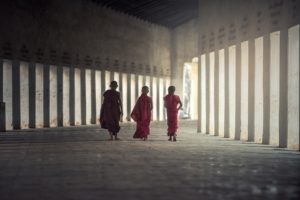Is the glass half full or half empty for Burma?
The people of Burma have been ruled by this military junta for over 40 years.
In 1988, groups of students and liberty activists began a protest. The military responded with violent repression, slaughtering thousands of Burmese. Out of the activist movement, the National League for Democracy (NLD) was formed, headed by the now-famous Aung San Suu Kyi. Free elections were held and the NLD was elected into power, but the military junta never allowed it to take place. Over the past 14 years, Suu Kyi has been either in prison or in forced house arrest. After the current demonstrators marched to her house on September 24, 2007, to demand her freedom, she was moved to another prison. The military has been careful not to respond with violence, but how long can this remain? Today, September 25th, the military took to the streets patrolling and announcing that there are to be no more protests. It has also placed into effect a curfew from dusk until dawn and decreed that groups of more than 5 people will not be permitted.
An optimist would say the glass is half full.
Democracy for Burma, with the NLD and Aung San Suu Kyi in charge, is just around the corner. A pessimist would say the glass is half empty, and violent repression of the protestors by the military dictatorship is just around the corner, perhaps in another day or so. Either result could happen, but the smart money is on the latter. So, we must ask the question, what can be done to gain freedom for the Burmese people? Today, President Bush spoke before the United Nations General Assembly and called for the military junta of Myanmar to allow the democratically elected government to form.
 He announced diplomatic and economic sanctions against the junta and called for other nations to take action. However, this is not enough. China, Myanmar’s neighbor to the north, is a firm supporter of the current state. As we have seen in Sudan, China is not in a hurry to change either their own or anyone else’s human rights record. India is also a supporter of Myanmar and it is likely due to a desire for some semblance of regional security that this is the case. According to David Mathieson (“Dangerous Optimism On Burma,” September 7, 2007, Mainichi Shimbun), a Burma consultant to Human Rights Watch, “Japan has an important role to play – perhaps more than any other country, Japan may be able to find a way through the diplomatic impasse to positively influence the military government.” Mr. Mathieson reports that Japan is the largest aid donor to Myanmar and maintains a high level of influence with the current military dictatorship.
He announced diplomatic and economic sanctions against the junta and called for other nations to take action. However, this is not enough. China, Myanmar’s neighbor to the north, is a firm supporter of the current state. As we have seen in Sudan, China is not in a hurry to change either their own or anyone else’s human rights record. India is also a supporter of Myanmar and it is likely due to a desire for some semblance of regional security that this is the case. According to David Mathieson (“Dangerous Optimism On Burma,” September 7, 2007, Mainichi Shimbun), a Burma consultant to Human Rights Watch, “Japan has an important role to play – perhaps more than any other country, Japan may be able to find a way through the diplomatic impasse to positively influence the military government.” Mr. Mathieson reports that Japan is the largest aid donor to Myanmar and maintains a high level of influence with the current military dictatorship.
At the bargaining table of optimism, it would seem, the U.S. needs to pull India, Japan, and China together to make serious diplomatic efforts in conjunction with economic sanctions to affect a peaceful process and establish an effective democratic government. The worldwide human rights activist community also needs to hold China’s feet to the fire and bring to light that country’s poor human rights record both at home and abroad, especially in light of the 2008 Olympics which are to be held in Beijing. The Chinese government, more than anything, does not want that spotlight on them at this moment in history. Over the years, when crimes against humanity have occurred, the world has often repeated the words “lessons from.” We have supposedly learned lessons from Nazi Germany. We have supposedly learned lessons from Rwanda. We have supposedly learned lessons from Bosnia. And, even now, with the conflict still occurring there, we should have learned lessons from Sudan. From Sudan we should know that strong sanctions and actions coupled with making firm demands from China could have saved countless lives, lessened the violence, and made possible a real peace. Instead, the world stood by (and stands by) and did a little while over 400,000, at the current count and still rising, Sudanese have lost their lives. A few years from now, will the leaders of the world, international policy experts, and the media be repeating the oft-cited phrase “lessons from?” Only this time, we will have learned another lesson from Burma. Another lesson which will still not be put to good use. Or can we, the international community, look at the world as a glass half full?





